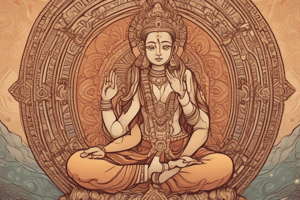Podcast
Questions and Answers
What is the primary purpose of performing Puja?
What is the primary purpose of performing Puja?
- To attain Moksha
- To invoke the deity and offer prayers (correct)
- To categorize individuals into social hierarchy
- To maintain social and moral order
What is the ultimate goal of Hindu worship?
What is the ultimate goal of Hindu worship?
- To attain Moksha (correct)
- To perform Karma
- To achieve Bhakti
- To attain Jnana
What is the primary focus of the Grihastha Householder stage of life?
What is the primary focus of the Grihastha Householder stage of life?
- Pilgrimage and yoga
- Spiritual pursuits and detachment
- Education and self-control
- Family and worldly responsibilities (correct)
What is the concept of Dharma primarily concerned with?
What is the concept of Dharma primarily concerned with?
What is the primary focus of the Vanaprastha stage of life?
What is the primary focus of the Vanaprastha stage of life?
What is the underlying principle of the Varna system in Hinduism?
What is the underlying principle of the Varna system in Hinduism?
What is the primary goal of the Brahmacharya stage of life?
What is the primary goal of the Brahmacharya stage of life?
What is the main objective of Hatha Yoga?
What is the main objective of Hatha Yoga?
What is the significance of Tirthas in Hindu pilgrimage?
What is the significance of Tirthas in Hindu pilgrimage?
What is the primary benefit of pilgrimage in Hinduism?
What is the primary benefit of pilgrimage in Hinduism?
What is the focus of Raja Yoga?
What is the focus of Raja Yoga?
What is the ultimate goal of the Sannyasa stage of life?
What is the ultimate goal of the Sannyasa stage of life?
What is the main significance of Darsan in Hindu pilgrimage?
What is the main significance of Darsan in Hindu pilgrimage?
What is the underlying principle of the Ashrama system in Hinduism?
What is the underlying principle of the Ashrama system in Hinduism?
What is the primary focus of Karma Yoga?
What is the primary focus of Karma Yoga?
Study Notes
Puja
- A ritualistic worship of a deity through offerings and prayers
- Can be performed at home or in a temple
- Typically involves:
- Purification of the body and mind
- Invocation of the deity
- Offerings of food, flowers, and incense
- Prayer and meditation
- Aarthi (circling a flame in front of the deity)
Worship
- Hindus worship a multitude of deities, each with their own significance and characteristics
- Worship can take many forms, including:
- Bhakti (devotion)
- Jnana (knowledge)
- Karma (action)
- The ultimate goal of worship is to attain Moksha (liberation)
Dharma
- A complex and multifaceted concept that encompasses:
- Social and moral order
- Righteous living
- Ethical behavior
- Duty and responsibility
- Dharma is considered essential for maintaining balance and harmony in the universe
Varna
- A system of social hierarchy that categorizes individuals into four groups based on their profession and social status:
- Brahmins (priests and scholars)
- Kshatriyas (warriors and rulers)
- Vaishyas (merchants and traders)
- Shudras (labourers and servants)
- Varna is not the same as caste, which is a more complex and nuanced system
Ashrama
- A system of four stages of life that an individual is expected to go through:
- Brahmacharya (student life): Focus on education and self-control
- Grihastha (householder): Focus on family and worldly responsibilities
- Vanaprastha (forest dweller): Focus on spiritual pursuits and detachment
- Sannyasa (renunciate): Focus on liberation and self-realization
Yoga
- A physical, mental, and spiritual practice that aims to unite the individual self with the universal consciousness
- Involves:
- Postures (asanas)
- Breathing techniques (pranayama)
- Meditation and concentration
- Yoga is considered a means to attain self-realization and liberation
Pilgrimage
- A sacred journey to a holy site or temple, often undertaken for spiritual purification and enlightenment
- Pilgrimage sites may include:
- Rivers (e.g. Ganges)
- Mountains (e.g. Himalayas)
- Temples (e.g. Tirupati)
- Pilgrimage is believed to help the individual attain spiritual merit and liberation
Studying That Suits You
Use AI to generate personalized quizzes and flashcards to suit your learning preferences.
Description
Test your knowledge of Hinduism and its key concepts, including Puja, Worship, Dharma, Varna, Ashrama, Yoga, and Pilgrimage. Learn about the significance of these concepts in Hinduism and how they relate to daily life and spiritual growth.




